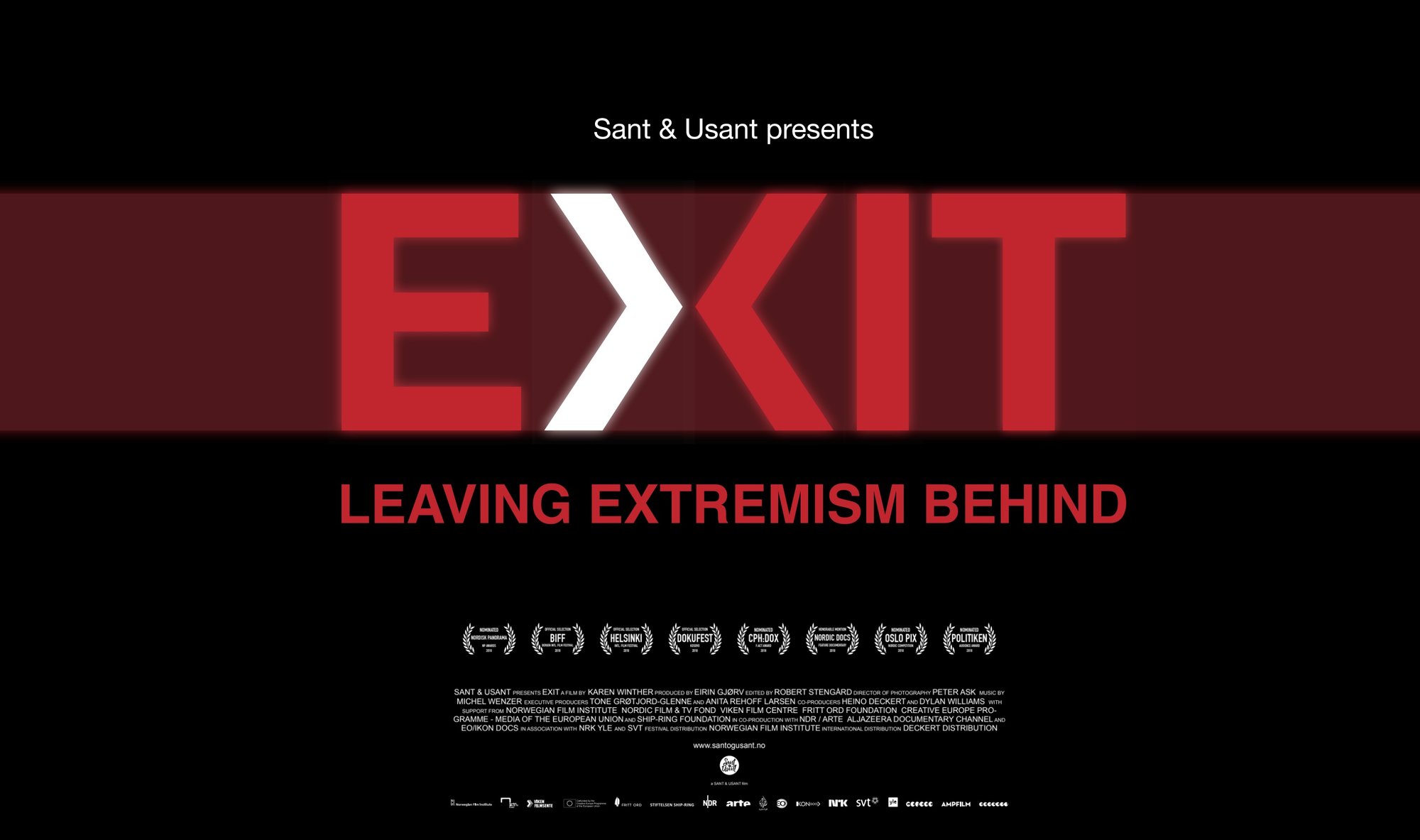Leaving extremism behind - film screening and conversation
October 16 2018
Sant og Usant, Fritt Ord, Oslo Documentary Cinema, the Consortium for Research on Terrorism and International Crime and the Centre for Research on Extremism (C-REX) invite the public to a screening of the documentary film Exit, followed by a discussion. Meet former left- and right-wing extremists and members of Jihadist movements from Germany, Denmark and France for a discussion after the film.
Tuesday, 16 October 5 p.m. at Vika Cinema
Tickets are available for purchase here.
What does it take to leave a violent, extremist movement? How does one break with everything that is familiar and start over from scratch? How can we as a community pave the way for individuals to find their way out of an extremist group?
The film Exit is the story of five people from Germany, Denmark, France and the USA who have broken away from different groups engaged in violent, political and religious extremism. At Vika Cinema, you can meet Manuel Bauer, Ingo Hasselbach, Søren Lerche and David Vallat for a discussion, along with Director Karen Winther. The moderator will be the journalist Ingerid Salvesen.
ABOUT THE FILM:
How does one get away from violent, extremist circles when it means making a break with everything and everyone that is familiar?
Our beliefs, along with our perceptions of the world and society, form the foundation for how we live our lives. What do you do if this foundation fails, and everything you once believed turns out to be wrong?
In the film Exit, Director Karen Winther sets out on a personal journey in search of answers about what has made five extremists choose to leave violence and hatred behind them. On her journey to Germany, France, Denmark and the USA, Karen also encountered unpleasant truths associated with her own extremist past.
Through close-up interviews, we get to know Angela from the USA, and Ingo and Manuel from Germany. They all have a history with right-wing extremist groups where using brutal violence against the “enemy” was common. Now, they live very isolated lives in hiding from the groups they used to be part of. As part of a violent anti-Fascist group, Søren from Denmark belonged on the other end of the spectrum. In France, we meet David, who was active in an Islamist terrorist group.
GUESTS:
Manuel Bauer grew up in East Germany. At age 13, he was recruited to a right-wing extremist group. He was extremely violent, earning him the nickname: “the pistol”. Experiences in prison caused him to reject his extremist ideology, and in 2006, the Exit programme in Germany helped him to leave the movement. He has been in hiding ever since.
Ingo Hasselbach also grew up in East Germany. After reunification, he became a leading figure in the Nazi subculture, where he was nicknamed “der Führer von Berlin”. Later, he began to doubt his ideology. Ingo has written a book about his past, and he helped to start the Exit programme in Germany.
Søren Lerche grew up in an ordinary middle-class family in Denmark, but had problems at school. In his teens, he joined a militant anti-Fascist movement. Following a prison sentence, he changed his view of life and his ideology of violence. Today, he works at a folk high school, teaching courses on how to prevent radicalisation and violent extremism.
David Gelding grew up in a suburb outside Lyon, France. He enlisted in the French Army and served in Bosnia during the Yugoslav Wars. There, he was recruited to radical Islam and was part of a group that called itself the GIA (Groupe Islamique Armé). In 1994, he was arrested and sentenced to prison for taking part in terrorism. The time he spent in prison made him change his outlook on life completely.
Angela King grew up in Florida, where she was more or less raised to be a racist and became a member of Aryan Nation at an early age. After the Oklahoma bombing in 1995, which was the work of a young right-wing extremist American, Angela wanted out of the organisation, but the people around her held her back. She was arrested for a robbery. In prison, she experienced the caring of others around her, making it impossible for her to maintain the racist ideology she had grown up with. Angela currently works full-time for the organisation Life After Hate.
Angela is in the film, but she will not be coming to Oslo.
